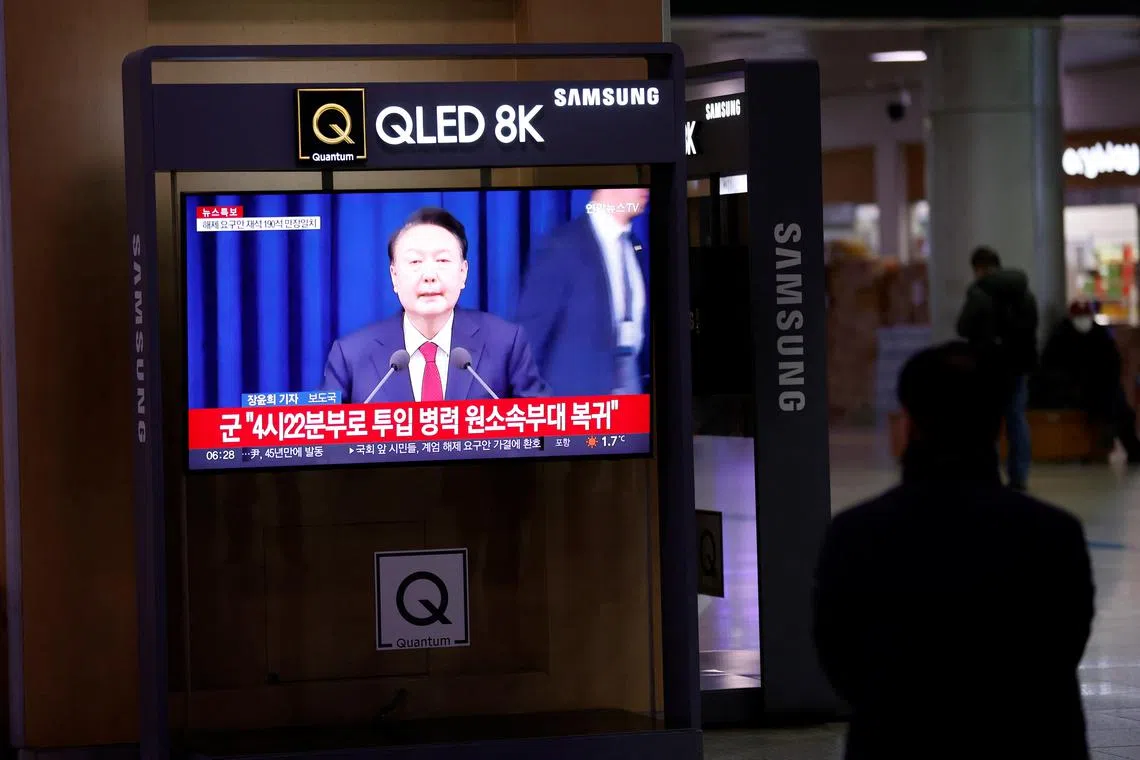Martial law decree sparks international backlash for South Korea
Sign up now: Get insights on Asia's fast-moving developments

South Korean President Yoon Suk Yeol declared martial law in a live TV address late on Dec 3, only to reverse course six hours later.
PHOTO: REUTERS
SEOUL – South Korean President Yoon Suk Yeol, who vowed to make his country a “global pivotal state”, faced immediate international diplomatic fallout on Dec 4 after his botched attempt to impose martial law.
He declared martial law in a live TV address late on Dec 3, only to reverse course six hours later
Swedish Prime Minister Ulf Kristersson – who was due to hold a summit with Mr Yoon this week – will skip the scheduled visit, his spokesperson said on Dec 4.
“Given the recent developments, we have decided to postpone the visit,” the spokesperson said in a statement.
The US – South Korea’s main ally – indefinitely postponed meetings of the Nuclear Consultative Group (NCG) and related tabletop military exercises, a US official said, speaking on condition of anonymity.
The NCG is a signature effort by Mr Yoon aimed at having South Korea play a greater role in allied planning for potential nuclear war on the peninsula.
Around 28,500 US troops are stationed in South Korea, and it was not immediately clear if other joint military exercises would be affected. A spokesperson for US Forces-Korea did not respond to a request for comment.
The US and South Korean militaries are “in contact”, the Pentagon said on Dec 3, adding there was no request for assistance from Seoul amid the unfolding events.
Major-General Patrick Ryder, the Pentagon spokesman, told a news briefing that he also did not believe the martial law declaration had any significant impact so far on the US troops, some of whom work in combined commands with the South Korean military.
A White House spokesperson earlier said the US was not notified in advance of Mr Yoon’s announcement and added: “We are seriously concerned by the developments we are seeing on the ground.”
The martial law declaration cast doubts over a possible visit next week by US Defence Secretary Lloyd Austin. Japanese media reported he was due to meet South Korean and Japanese counterparts as part of trilateral efforts championed by Mr Yoon.
Japan’s lawmaker group on Korean affairs led by former prime minister Yoshihide Suga cancelled a Seoul visit slated for mid-December, multiple Japanese outlets reported.
“The turmoil in South Korea’s domestic politics since last night continues to be alarming,” said Mr Akihisa Nagashima – a special adviser to Japanese Prime Minister Shigeru Ishiba – who was due to travel with the group.
“It is a tense situation in which the fate of the Yoon administration must be closely watched to see whether it will be able to overcome the fierce public opposition.”
Mr Ishiba told reporters: “We are monitoring (the South Korea situation) with particular and grave interest,”
Dr Kim Du-yeon of the Centre for a New American Security said: “Yoon’s international reputation as the beacon and symbol of democracy is now shot.
“The fate of Yoon’s foreign policies remains uncertain and even bleak.” REUTERS


